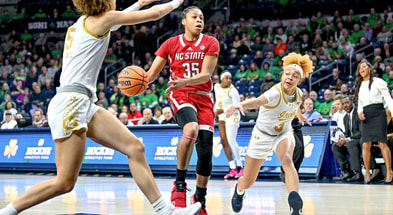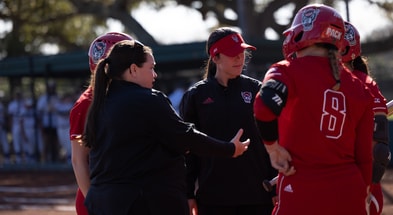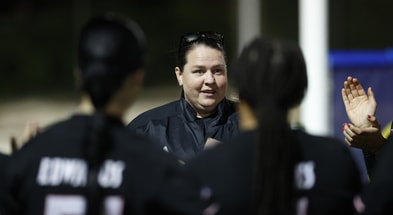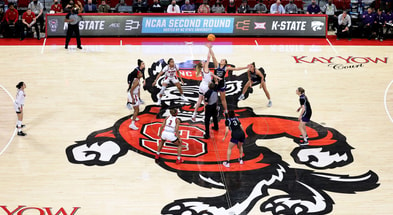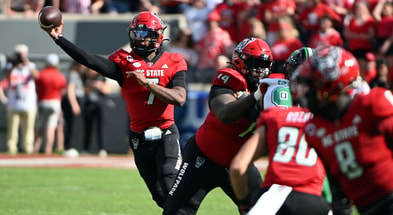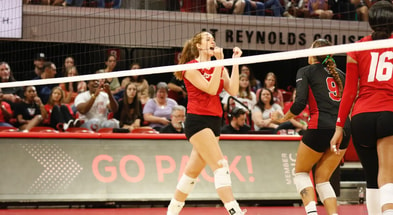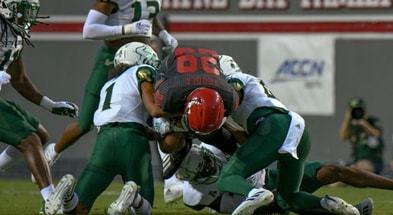ACC meetings net progress, at least publicly, on conference unity
On Tuesday night, arguably the central figure in much of the online chatter about the future of the Atlantic Coast Conference, Florida State director of athletics Michael Alford, spoke to the media for the first time since the league meetings began in Amelia Island, Fla. Alford painted a picture, at least publicly, that talk of the immediate and imminent demise of the ACC is “probably overblown.”
That is significant coming from Alford, who has been the most vocal among ADs in the league about concerns about the growing revenue disparity in the ACC relative to the financial powerhouses of the Southeastern Conference (SEC) and Big Ten.
“The ADs and the universities are very unified,” Alford said. “So, we’re thrilled about being in this league, and we want to stay in it.”
Reports emerged Monday that seven ACC schools, including NC State, were having discussions about the league’s grant of rights, which effectively ties the conference together for the duration of the television contract with ESPN, which runs through 2036.
How tightly knit that group of seven, which also included Clemson, Florida State, Miami, North Carolina, Virginia and Virginia Tech, were bound was questionable. However, one anonymous AD at an ACC school told ESPN.com that those seven schools are not acting alone.
“Everyone has taken a look at the grant of rights,” that athletic director said. “You’d be crazy not to, but no one is going anywhere.”
According to that same ESPN report, ADs in the ACC are expecting a conference payout of about $43 million this year. Both the SEC and Big Ten are likely to have approximately $30 million more than that to hand out to their schools after lucrative new media deals start. In addition, both leagues will be able to renegotiate their television contracts before the ACC’s long-term deal signed in 2016 expires, likely furthering the gap.
To that end, Alford and others have been pushing for a new revenue distribution model vs. the traditional equal share that the ACC has used, and there was progress this week on a new formula that would be performance-based.

Alford noted there are scenarios in which a conference team that makes the College Football Playoff could add more than $10 million to its conference share. However, it is not likely that the equal distribution from the television contract will be altered, which Alford also has additionally pushed to change.
“We just need to be in a competitive boat,” Alford said. “We’re the third-best media agreement right now. We want to stay the third best. We need to be able to compete. As long as we’re there and competitive, that’s what the number is.”
Leaving the ACC would be a potentially expensive proposition. The exit fee currently is about $120 million, and the grant of rights would add exponentially more to that figure since a departing school would forfeit the broadcast rights to its home games.
Miami director of athletics Dan Radakovich explained the conundrum the ACC faces to ESPN.com.
“Trying to keep things the same isn’t going to work, but moving away is expensive and difficult,” Radakovich stated. “Sure, they could pay the $120 million and litigate the other piece. But where does that put them? Where does it put anybody?
“It’s hard. We don’t have an answer yet. So, I think it’s better to all get into a room and talk about it.”
Radakovich added that the name, image and likeness deals that student-athletes can now monetize adds to the urgency of the situation.
“We have this gap, and the gap is just not about the money,” Radakovich said. “It’s about schools being able to take those dollars and translate it into potential NIL opportunities for student-athletes. So, forget about the fact that you might go and steal a coach if you have more money. Now it’s going to get better players. That’s where the rubber hits the road.”
